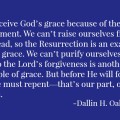This article is for all the perfectionists—those people who hate making mistakes, who want everything in their lives turn out perfectly. I used to think perfectionism went hand-in-hand with the gospel of Jesus Christ—after all, the Savior himself counseled us to “be ye therefore perfect, even as your Father in Heaven is perfect.” (Matthew 5:48). But nothing could be farther from the truth.
Lessons from a trumpet studio
 I spent the first half of my life as a perfectionist. I loved to “line all my ducks in a row.” I paid attention to detail. I saw the bigger picture in life and worked hard each day perfecting all areas whether they needed it or not. When I was getting my undergraduate degree in music education, I was at the height of my perfectionist persona, and I was good at it. Each semester, I needed to prepare a solo to perform, like a final exam. The audience consisted entirely of music faculty, many of which were more than eager to cut unwanted “dead weight” from the music program. I never had any problems performing well until my junior year. My trumpet instructor challenged me to play the first movement of the Hummel Trumpet Concerto in E flat major. Embedded in the middle of one of the most difficult passages was a high note, well above the staff and at the top of my musical range. It taunted me during my lessons. I spent hours doing everything I could to hit this note clearly and beautifully, but to no avail. This became more and more stressful to me as the weeks drew closer to my final performance exam. I felt the pressure of being perfect weigh heavily on my shoulders. I didn’t want to let my instructor down. I even feared if I couldn’t hit that note, I would be on the “cut list”—three years of music education wasted. During each lesson, my performance of the passage worsened. Soon I had difficulty even with the sections I had once mastered. It was a miserable time.
I spent the first half of my life as a perfectionist. I loved to “line all my ducks in a row.” I paid attention to detail. I saw the bigger picture in life and worked hard each day perfecting all areas whether they needed it or not. When I was getting my undergraduate degree in music education, I was at the height of my perfectionist persona, and I was good at it. Each semester, I needed to prepare a solo to perform, like a final exam. The audience consisted entirely of music faculty, many of which were more than eager to cut unwanted “dead weight” from the music program. I never had any problems performing well until my junior year. My trumpet instructor challenged me to play the first movement of the Hummel Trumpet Concerto in E flat major. Embedded in the middle of one of the most difficult passages was a high note, well above the staff and at the top of my musical range. It taunted me during my lessons. I spent hours doing everything I could to hit this note clearly and beautifully, but to no avail. This became more and more stressful to me as the weeks drew closer to my final performance exam. I felt the pressure of being perfect weigh heavily on my shoulders. I didn’t want to let my instructor down. I even feared if I couldn’t hit that note, I would be on the “cut list”—three years of music education wasted. During each lesson, my performance of the passage worsened. Soon I had difficulty even with the sections I had once mastered. It was a miserable time.
My instructor picked up on the fact that I was deteriorating fast. He, being a highly talented musician and a brilliant master of human behavior, had a solution. It didn’t involve breathing exercises, embouchure repositioning, or any other brass-centered techniques. He simply pointed to the troubling high note on the music page looked me in the eye and said, “Nanette, you have my permission to miss this note. You will not fail your exam if you do, because you have my permission to miss it. Now let’s move on and work on making the rest of the piece beautiful.” From that point on, the pressure to be perfect was gone. I was able to relax. I felt my instructor was in my corner, fighting the musical fight with me. I was not tackling this alone. So I did exactly what he said; I focused on the rest of the piece to make it the most beautiful piece of music I had ever played. And amazingly, I never missed that note again.
“Come unto Christ and be perfected in him.” (Moroni 10:32).
 Understanding the gospel of Jesus Christ is a life-long endeavor. Happily, we have experiences in our lives that help point us in the right direction—ones that help us see more clearly what the atonement means and how to apply it. We are counseled in the scriptures to be perfected in Christ, but erroneously, we think this means we must never makes a mistake. This puts us in a position to be good at everything all the time, correct all the time, or in control of everything, when clearly we cannot measure up to such unrealistic standards. The word “perfect” translated from the Greek, means “complete, finished, fully developed.” In our limited understanding of our partnering with Christ, we somehow abandon the gentler definition of completeness for a more self-absorbed definition of all-or-nothing perfectionism. We want to go it alone. We like the feeling of “do it yourself success”. We take on the burdens of life as if we alone must master them. We forget that we are partners in life with the Savior.
Understanding the gospel of Jesus Christ is a life-long endeavor. Happily, we have experiences in our lives that help point us in the right direction—ones that help us see more clearly what the atonement means and how to apply it. We are counseled in the scriptures to be perfected in Christ, but erroneously, we think this means we must never makes a mistake. This puts us in a position to be good at everything all the time, correct all the time, or in control of everything, when clearly we cannot measure up to such unrealistic standards. The word “perfect” translated from the Greek, means “complete, finished, fully developed.” In our limited understanding of our partnering with Christ, we somehow abandon the gentler definition of completeness for a more self-absorbed definition of all-or-nothing perfectionism. We want to go it alone. We like the feeling of “do it yourself success”. We take on the burdens of life as if we alone must master them. We forget that we are partners in life with the Savior.
Satan’s plan is to separate us from Heavenly Father through lies.
Ultimately, we fall under the unbearable weight of perfectionism. Going through life alone is not being made perfect in Christ. It’s spiritual suicide. Satan, the father of all lies, would love nothing more than to see us separated from Christ. He is the one telling us we cannot make mistakes. He knows this is a lie. He knows by virtue of our nature, we will make mistakes, and that we need Christ to be complete and whole. His goal is to make us think we can be perfect without Christ. If you have ever felt so burdened with life’s pressures, if you have ever felt spiritually alone, if you have ever felt like you can’t measure up, then you have felt Satan working on your heart. But Satan cannot thwart the plan of the one being who became perfect and who willingly allows you to partake in His perfection—Jesus Christ.
The Savior’s atonement is our spiritual safety net
“For God sent not his Son into the world to condemn the world’ but that the world through him might be saved.”(John 3:17 emphasis added). This particular scripture follows one of the most quoted scriptures from the Holy Bible, John 3:16. Verse 17 tells us how our Heavenly Father does not want to condemn us, but save us. This re-emphasizes the loving nature of our Father in Heaven through the great plan of happiness.
He sent his son because he loved us enough to bring us home. Jesus Christ lived a sinless life, but even he spent his days being perfected line upon line with his Father in Heaven. He atoned for the sins and afflictions of everyone, so that we would not have to bear the burden of imperfection. His atonement makes up for the imperfections we inevitably must
face. It gives us permission to be imperfect, to miss the high note once in a while, as long as we do our best to keep his commandments, repent, and dedicate ourselves to his eternal plan. That safety net is never going away.
Walking with the Savior is being perfect in him
The atonement allows us to let go of our fears of failure or not measuring up. It makes up for our shortcomings and strengthens our weaknesses. It allows us to remember the wholeness we were born with as spiritual children of God and reminds us that with Christ, we will have that wholeness again. Embracing his love, allowing him to be our Savior, is like falling into the secure and perfect arms of a loving brother who wants you to win the race so desperately, he is willing to carry you across the spiritual finish line, every step of the way. Truly, we cannot be perfect on our own. We cannot make it without Him.
About Nanette ONeal
Nanette O'Neal loves the gospel and is very happy to share her testimony on LDS Blogs. She is a convert to the church and still feels the spirit burn strong within her heart. She graduated from Mason Gross School of the Arts with a degree in music education and has taught children and adults in the private and public sphere for over twenty years. Nanette continues to study the gospel and the art of writing. She writes weekly inspirational articles on her blog and is currently working on an LDS fantasy novel series, A Doorway Back to Forever. You can find her at NanetteONeal.blogspot.com. Nanette has a wonderful husband, talented son, and three beautiful dogs.








it’s true we frequently confuse the eternal plan…we frequently think it means to obey all of the commandments, when really we are asked to come to know Christ and be saved by Him.
It is hard to really come to grips with just how imperfect we really are and will continue to be…as we see how it affects those around us.
I agree with your post. Unfortunately, we can get a little hung up on things that aren’t important. It is essential that we, as members, choose to take heart or to have courage. When we partake of the sacrament on Sundays, I believe it to be the most appropriate time to ponder how to take heart, with special regard to the Savior’s heart. In Mosiah 5, King Benjamin discusses how one day we will all be called by the name of Christ. Essentially, we will be renamed because Christ’s name will be written on to our hearts. How might someone come nearer to the idea that having his name on our hearts does not mean to be perfect in an instant, but to become perfect over time—to do your best?